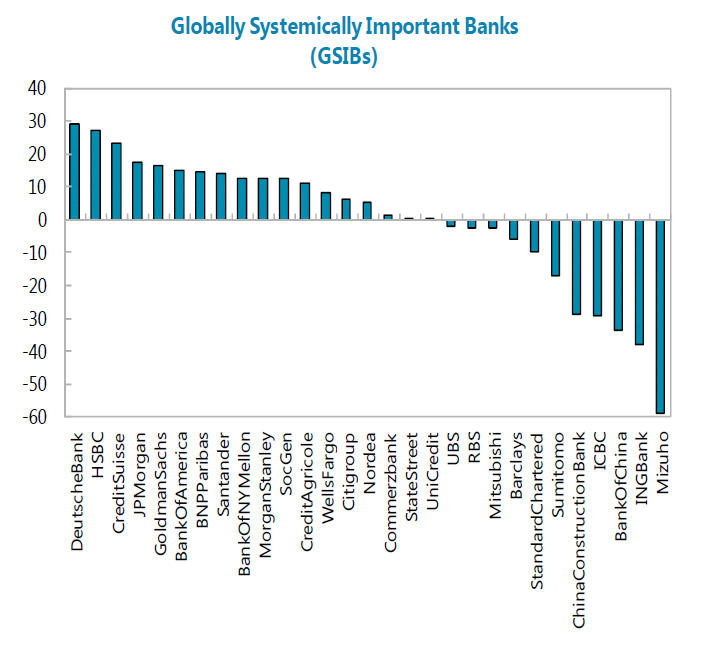
Why have Credit Suisse shares dropped so low?

When he took over at the helm of Credit Suisse last July, Tidjane Thiam could hardly have expected - just one year on - to be denying reports of the company being broken up and sold off. It has been one of those years for the bank whose share price dropped below CHF10 for the first time.
IG Bank analyst Laurent Bakhtiari said the share price falling below the psychological barrier was a “shock for all the investors in the market”. “It is hard to believe that it would happen so quickly and so easily,” he said in a note, before raising a more shocking possibility.
“After years of poor management, seeing Credit Suisse being acquired by another company would not be surprising anymore.”
Bakhtiari blamed the development on Brexit and Thiam’s recent statements that there would be no fresh capital increases to boost the bank’s capital.
Much of the Swiss media hailed Thiam as a likely saviour of the struggling bank last summer. Most of these headlines have turned sour in a remarkably short time span. “The group will stay intact,” Thiam was forced to tell the SonntagsBlick newspaper on Sunday. “A takeover is not a subject.”
While Thiam has been defending the bank’s very future, his boss – Chairman Urs Rohner – has been forced to defend his choice of chief executive. “I am convinced, like the rest of the board, that he is the right man for the job,” Rohner recently told the Handelszeitung newspaper. “He has taken the right measures and will continue to do so.”
So what’s gone wrong?
Legacy
“To be fair to Thiam, he has inherited a large part of the issues at Credit Suisse,” says Bank Vontobel analyst Andreas Venditti.
These include a strategy that has failed to convince the markets, a struggle to meet regulatory requirements and a variety of damaging legal issues – some of which have also hit other banks.
Strategy
Credit Suisse actually suffered less pain than most of its competitors during the financial crisis. Having spurned the scale of mortgage debt trading excess that brought down Lehman Brothers, Credit Suisse was better positioned than many in 2008 to take advantage of the expected market upturn.
Hence former CEO Brady Dougan (an investment banker) decided not to follow the example of cross-town Zurich rival UBS, which substantially slashed its investment banking operation. Unfortunately, the markets failed to oblige with a recovery. Each glimmer of hope that trading conditions would improve was snuffed out by another major global problem such as Greek debt wobbles or a slowdown in emerging economies.
Charting a long term course in such turbulent conditions is always a gamble – but was Dougan actually reckless? Not necessarily, according to Venditti. “He may have underestimated how bad the market environment would be, and the impact of legislation,” he said. “But UBS was facing much larger problems so it was a simpler decision to downsize. Credit Suisse believed they would be better placed to make profits when markets improved.”
Since taking office, Thiam has announced 6,000 job cuts, saying the bank will reduce risk and raise CHF6 billion in fresh capital. But some of the impact of these statements was lost when the bank recorded CHF2.9 billion losses in 2015 – partly as a result of bad trades that senior managers were unaware of.
Regulations
Credit Suisse’s investment banking heavy strategy has lumbered it with a tough time meeting regulatory requirements that cushion against risk. Such trading, by its very nature, requires the bank to take on riskier positions than in wealth management. This inflates the amount of capital it has to set aside to cover potential losses.
According to the International Monetary Fund (IMF), Credit Suisse poses the third largest risk to global financial stability than any of the “too big to fail” banks in the world (see graph below).
Thiam has made it one of his priorities to scale back on risky assets on the bank’s books to help it meet regulatory capital requirements. But selling off such assets also carries risk, according to Venditti.
“Running down such a huge book legacy is a big risk and can result in losses. Selling off such assets can only be done profitably if market conditions are right. If losses start to become unreasonable then this could hurt the bank’s capital,” he said.

How much more time does Tidjane Thiam need to turn Credit Suisse around? Have your say.

In compliance with the JTI standards
More: SWI swissinfo.ch certified by the Journalism Trust Initiative




























You can find an overview of ongoing debates with our journalists here . Please join us!
If you want to start a conversation about a topic raised in this article or want to report factual errors, email us at english@swissinfo.ch.